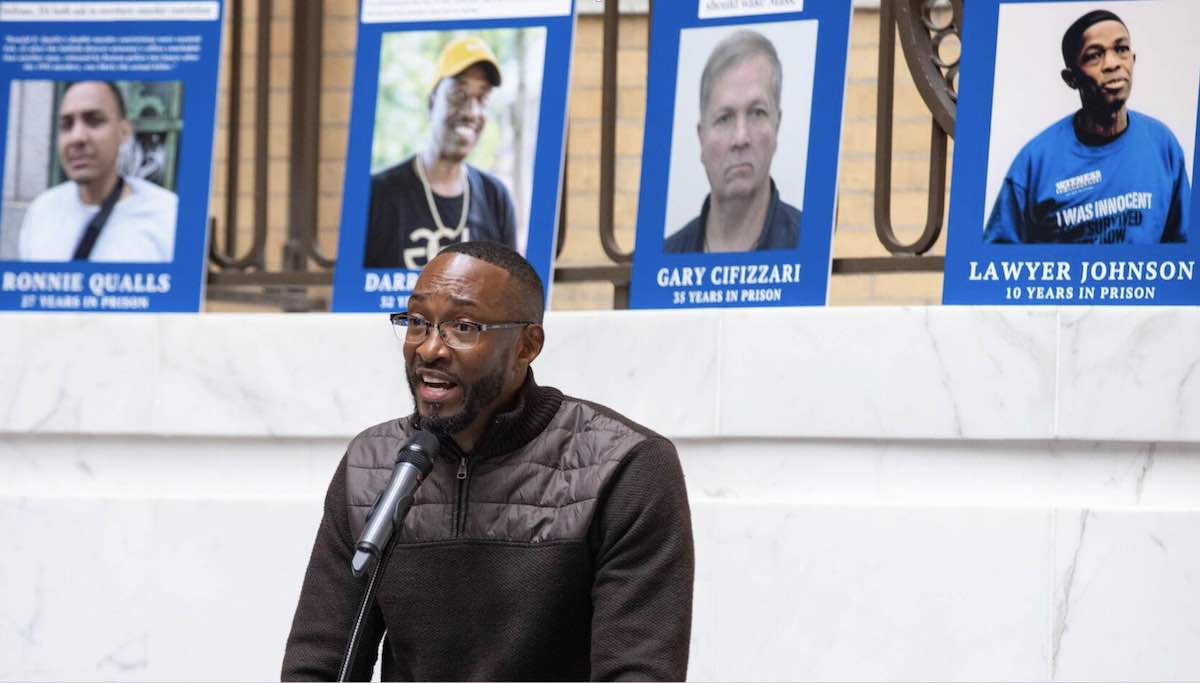latest
Wrongfully Convicted Knock Massachusetts Compensation Cap

By Sam Doran
Advocates made their latest pitch Wednesday for the state to award greater compensation to wrongfully convicted people who have been exonerated of their crimes.
Currently, state law caps the amount an exoneree can be awarded at $1 million. For someone who spends decades behind bars for a crime they didn’t commit, that works out to less than $100 per day for their lost livelihood.
“The average number of years spent in prison by our exoneree network community members is 28 years and 3 months,” Exoneree Network Director Sean Ellis said at a Wrongful Conviction Day event at the State House.
Ellis, the subject of the Netflix documentary “Trial 4,” said that average exoneree receives a maximum of $96.81 per day for their 28 years in prison.
“With the current cap, the longer a person endures wrongfully convicted in prison, the less you’re awarded … This is our judicial system. However, the promising thing is, we have the power to change this. People in this room have the power to change this,” he said, looking at a crowd in the Great Hall that included several lawmakers.
Three similar bills filed by Sen. Patricia Jehlen, Rep. Jeffrey Roy, and Rep. Christopher Worrell would remove the compensation cap and provide immediate transitional assistance when an exoneree is released. Those bills were incorporated into a larger omnibus package by the Joint Committee on the Judiciary, which was not released from committee until Aug. 8, after formal lawmaking sessions had already ended for the term. The bill (H 4989) has sat since then in the House Ways and Means Committee.
Of the wrongful convictions in Massachusetts that are exonerated, 61 percent involve “official misconduct,” according to the event’s organizers. Thirty-nine percent involve eyewitness misidentification and 37 percent involve “flawed forensics,” according to a handout from the Exoneree Network, New England Innocence Project, Committee for Public Counsel Services, and Boston College Innocence Program.
Rep. Jeffrey Roy described looking “into the eyes” of wrongfully convicted people, and how he was inspired by the statue of a priest, Monsignor John Egan, at DePaul University. The base of the monument includes an inscription: “What are you doing for justice?”
“And that monument in question stopped me in my tracks, it was so direct and chilling,” Roy said. “And as I stood there, I was reminded of how we all confront that question every single day. And that’s the ‘why’ behind my involvement with [the compensation bill] and why I’m here today.”
A flyer handed out at the event described monetary compensation as the “minimum” that state government can do for exonerated people. The law, proponents said, should extend to social services access, added compensation for time spent on probation or parole, immediate financial assistance upon release, compensation if innocence is proven after the conviction was vacated for another reason, and “automatic fast track for litigation.”
There have been 94 exonerations in the Bay State since 1989, the groups said, and the people who were wrongfully convicted and sent to prison lost a total of 1,341 years of their lives.
Worrell told the crowd that more than half of exonerated people are Black, while Black people make up 13 percent of the population.
“I don’t think I can spell it out any more plainly than, wrongful conviction is also racist conviction,” the Boston Democrat said.





